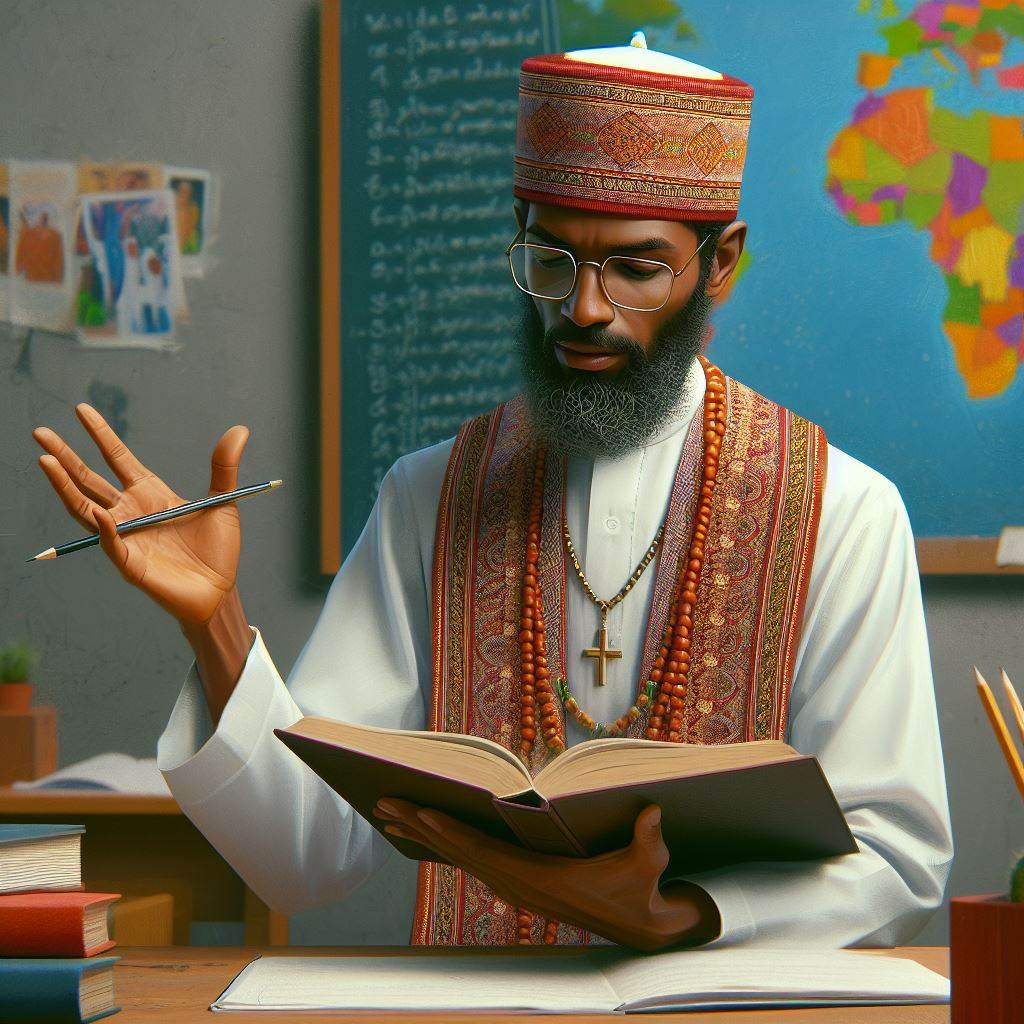Introduction
Importance of CRS in Nigeria
Christian Religious Studies (CRS) plays a vital role in shaping moral values and ethical principles in Nigeria.
It provides students with a deeper understanding of Christianity’s teachings and their relevance in daily life.
Evolution of the Curriculum
- Inception: CRS curriculum initially focused on basic biblical teachings and moral instructions.
- Expansion: Over the years, the curriculum expanded to include historical, cultural, and doctrinal aspects.
- Inclusivity: Efforts were made to ensure inclusivity, covering various denominations and theological perspectives.
- Integration: The curriculum integrated contemporary issues, promoting critical thinking and relevance in modern society.
- Adaptation: To reflect societal changes, the curriculum adapted to address emerging ethical dilemmas and global challenges.
- Diversification: Recent developments have seen the inclusion of comparative religious studies, fostering religious tolerance and understanding.
The evolution of the CRS curriculum reflects Nigeria’s dynamic society, highlighting the need to adapt teachings while preserving values.
Historical background
The Christian Religious Studies (CRS) curriculum in Nigeria has evolved over the years to reflect changes in society.
Origins of CRS curriculum in Nigeria
CRS curriculum in Nigeria can be traced back to the colonial era when Christian missionaries introduced religious education.
key developments and changes in the curriculum
- Integration of CRS into the national education system
- Emphasis on moral values and character development
- Inclusion of cultural and traditional religious practices
- Introduction of new teaching methods and technologies
- Adaptation to the changing needs of students and society
Colonial era introduction
During the colonial era, Christian missionaries were instrumental in introducing religious education in Nigerian schools.
The focus was on instructing students in the beliefs and practices of Christianity.
Post-Independence developments
After Nigeria gained independence, the CRS curriculum underwent several changes to reflect the diverse religious landscape of the country.
Moral values and character development
One key development in the CRS curriculum is the emphasis on moral values and character development.
Teachers strive to instill ethical principles and promote good behavior among students.
Cultural and traditional practices
Another significant change in the CRS curriculum is the inclusion of cultural and traditional religious practices.
This allows students to learn about the religious beliefs and practices of different ethnic groups in Nigeria.
New teaching methods and technologies
Advancements in educational technologies have also influenced the evolution of the CRS curriculum.
Teachers now utilize interactive tools and multimedia resources to engage students in learning.
Changing needs of students and society
The CRS curriculum has adapted to meet the changing needs of students and society.
There is a focus on promoting religious tolerance, interfaith dialogue, and respect for diverse beliefs.
In essence, the evolution of the Christian Religious Studies curriculum in Nigeria reflects the dynamic nature of religious education.
By integrating new developments and changes, the curriculum ensures students grasp religious beliefs and practices comprehensively.
Read: Digital Media Trends in Communication Arts
Influence of Colonialism
One of the key aspects that have influenced the evolution of the Christian Religious Studies (CRS) curriculum is colonialism.
Colonialism played a significant role in shaping the early CRS curriculum in different parts of the world.
During the colonial period, European powers spread their influence to various parts of the world, including Africa, Asia, and the Americas.
As part of their colonial project, they introduced their religion, Christianity, which profoundly influenced the education system in the colonized regions.
How colonialism shaped the early CRS curriculum
Colonial powers imposed their educational systems on the colonies, which included teaching Christianity as part of the curriculum. This had a lasting impact on the way CRS was taught in these regions.
- Curriculum content: The early CRS curriculum focused primarily on teaching the tenants of Christianity as interpreted by European missionaries.
- Language of instruction: In many colonies, including Nigeria, the teaching of CRS was conducted in the language of the colonizers, which limited access to education for many indigenous populations.
- Focus on European history and culture: The early CRS curriculum often centered on European history, culture, and beliefs, marginalizing indigenous knowledge and practices.
The impact of missionary activities on the teaching of CRS in Nigeria
In Nigeria, missionary activities played a crucial role in the teaching of CRS and the development of the curriculum. Christian missionaries, mostly from Europe and America, introduced Christianity to the region and established schools to educate the local population.
- Integration of Christian teachings: The early CRS curriculum in Nigeria integrated Christian teachings and doctrines, emphasizing the importance of faith and moral values.
- Conversion efforts: Missionaries used the teaching of CRS as a means of converting the local population to Christianity, leading to the widespread adoption of the religion in Nigeria.
- Transformation of indigenous beliefs: The teaching of CRS in Nigeria also led to the transformation of indigenous beliefs and practices, as Christianity became more dominant in the region.
Colonialism profoundly influenced the CRS curriculum, shaping its content, language of instruction, and focus on European history and culture.
Missionary activities in Nigeria further contributed to the development of the CRS curriculum, emphasizing Christian teachings and doctrines. Understanding these influences is essential in comprehending the current state of CRS education and its continued evolution.
Read: Impact of Communication Arts on Nigerian Media
Integration of indigenous practices
- Explore how the CRS curriculum has incorporated local traditions and beliefs.
- Discuss efforts to make the curriculum more inclusive and representative of Nigeria’s diverse religious landscape.
The evolution of the Christian Religious Studies (CRS) curriculum in Nigeria deliberately integrates indigenous practices into education.
The Christian Religious Studies curriculum evolved to recognize Nigeria’s rich cultural heritage and diverse religious beliefs.
It incorporates local traditions and beliefs to offer a more comprehensive understanding of Christianity in the Nigerian context.
Incorporating local traditions and beliefs
The CRS curriculum integrates indigenous practices to foster cultural appreciation and promote religious tolerance among students.
By exploring local traditions and beliefs, students gain a deeper insight into the customs and rituals that shape the religious landscape of Nigeria.
This approach bridges the gap between theoretical knowledge and practical experience, enabling students to engage meaningfully with Christianity.
The CRS curriculum considers diverse religious practices within Nigerian society by integrating local traditions and beliefs.
This inclusivity mirrors Nigeria’s diverse religious landscape, exposing students to varied Christian perspectives.
The curriculum encourages students to embrace diversity, respecting different religious traditions, fostering a harmonious, understanding community.
Making the curriculum more inclusive and representative
Efforts to make the CRS curriculum more inclusive and representative of Nigeria’s diverse religious landscape have been ongoing.
In recent years, there has been a push to broaden the scope of the curriculum to include a greater variety of religious practices and beliefs.
This expansion aims to provide students with a well-rounded education that reflects the complexity of Nigeria’s religious heritage.
One way in which the CRS curriculum has become more inclusive is through the incorporation of cultural festivals and ceremonies.
Studying these events enables students to grasp the religious significance and cultural practices defining Nigeria’s diverse communities.
This approach helps to contextualize Christianity within the broader cultural landscape, showcasing the interconnectedness of religion and tradition.
Additionally, efforts have been made to include prominent figures and leaders from various religious traditions in the curriculum. By highlighting the contributions of individuals from different backgrounds, the curriculum seeks to promote cross-cultural dialogue and understanding.
This approach enriches students’ knowledge of Christianity and fosters unity and cooperation across religious divides.
Most importantly, the evolution of the Christian Religious Studies curriculum in Nigeria demonstrates a commitment to inclusivity and diversity.
Educators aim to provide students with a comprehensive understanding of Christianity by integrating indigenous practices and expanding the curriculum’s scope.
Through these efforts, the CRS curriculum promotes cultural appreciation, religious tolerance, and interfaith dialogue among students. It fosters a more harmonious and understanding society.
Read: Developing Critical Thinking in Language Arts

Find Out More: Traditional vs. Contemporary Nigerian Arts
See Related Content: Debates in International Politics: Nigerian Viewpoints
Learn More: The Role of Culture in Nigerian Fashion Design
Contemporary challenges
Identifying current issues facing the teaching of Christian Religious Studies (CRS) in Nigeria is crucial to understanding the evolution of the curriculum in recent times. Here are some of the challenges:
- Lack of qualified teachers: One of the major issues facing the teaching of CRS in Nigeria is the shortage of qualified educators in this field. Many teachers lack the necessary training and expertise to effectively teach religious studies.
- Religious diversity: Nigeria is a country with a diverse religious landscape. With a population that consists of Christians, Muslims, and traditional worshippers, there is often tension and conflict over the teaching of CRS in schools. Some argue that the curriculum is biased towards Christianity, neglecting the beliefs of other religious groups.
- Secularism vs. religious education: There is an ongoing debate in Nigeria about the role of religious education in schools. Some argue that CRS should be taught to promote moral values and ethics, while others believe that it should be kept separate from the secular education system.
Discussing debates surrounding the content and relevance of the CRS curriculum in a modern context is essential for understanding how the curriculum has evolved over time. Here are some key points to consider:
Content debates
- Inclusion of other religions: There is a growing push for the CRS curriculum to include teachings from other religions, not just Christianity. This reflects the diverse religious landscape of Nigeria and promotes religious tolerance and understanding.
- Gender sensitivity: Critics argue that the current CRS curriculum is not gender-sensitive and perpetuates stereotypes and biases. There is a need for the curriculum to be more inclusive and respectful of gender diversity in its teachings.
- Relevance of teachings: Some question the relevance of certain teachings in the CRS curriculum, especially in a rapidly changing and modern society. It is important for the curriculum to adapt to new ideas and concepts while still preserving its core teachings.
Relevance debates
- Social issues: In a society grappling with social issues such as corruption, poverty, and inequality, there are debates about how the CRS curriculum can address these challenges and offer solutions grounded in religious teachings.
- Technology integration: With the increasing use of technology in education, there are discussions about how the CRS curriculum can leverage technology to enhance learning experiences and reach a wider audience.
- Global perspectives: Given the interconnected nature of the world today, there are debates about how the CRS curriculum can incorporate global perspectives and teachings to prepare students for a diverse and multicultural world.
In short, the evolution of the Christian Religious Studies curriculum in Nigeria is influenced by a myriad of contemporary challenges and debates.
Addressing these issues is essential for ensuring that the curriculum remains relevant and impactful for students in a rapidly changing society.
Read: Comparing Communication Arts and Mass Communication
Gain More Insights: International Relations and Strategic Studies in Nigeria
Transform Your Career with Expert Guidance
Get personalized mentorship consulting that’s tailored to your unique path. Our expert advice is actionable and exclusive.
Get StartedUncover the Details: Islamic Studies Conferences in Nigeria
Efforts towards reform
Recent initiatives to update and improve the CRS curriculum
The evolution of the Christian Religious Studies (CRS) curriculum has seen significant efforts towards reform in recent years. Various key initiatives have been undertaken to enhance the content, delivery, and overall effectiveness of this important educational program.
One of the major recent initiatives to update the CRS curriculum has been the revision of existing course materials to reflect contemporary issues and developments in the field of religious studies.
This has involved a thorough review of the curriculum content to ensure that it remains relevant and engaging for students.
Another important aspect of the reform efforts has been the introduction of new teaching methodologies and approaches to enhance student learning outcomes.
Educators have been encouraged to adopt innovative techniques that promote critical thinking, analytical skills, and a deeper understanding of religious concepts.
In addition, efforts have been made to incorporate a more diverse range of perspectives and voices into the CRS curriculum.
This includes the inclusion of non-traditional viewpoints, texts, and interpretations to provide students with a more comprehensive understanding of the diversity within the Christian faith.
The role of stakeholders
The role of government agencies in shaping the curriculum
Government agencies play a crucial role in shaping the CRS curriculum through policy decisions, funding allocations, and oversight of educational standards.
They provide guidance and direction to educators and institutions to ensure that the curriculum meets the required objectives and aligns with national educational priorities.
The role of religious leaders in shaping the curriculum
Religious leaders also play a significant role in shaping the CRS curriculum by providing input, guidance, and support to educators.
They offer valuable insights into the theological and doctrinal aspects of the curriculum, as well as practical perspectives on how to effectively teach religious studies to students.
The role of educators in shaping the curriculum
Educators are at the forefront of curriculum development and play a pivotal role in shaping the CRS curriculum.
They are responsible for designing, implementing, and assessing the effectiveness of the curriculum, as well as adapting it to meet the diverse needs and learning styles of students.
In review, the evolution of the CRS curriculum is an ongoing process that requires collaborative efforts from various stakeholders, including government agencies, religious leaders, and educators.
By working together to update and improve the curriculum, we can ensure that students receive a comprehensive, relevant, and engaging education in Christian religious studies.
Discover More: Foreign Language Learning Apps Popular in Nigeria
Conclusion
Christian Religious Studies curriculum has evolved to encompass a more comprehensive understanding of Christianity’s history, doctrines, and practices. It has shifted from rote learning to critical thinking and analytical skills development.
Key points discussed include the incorporation of various teaching methodologies, a more inclusive approach to religious diversity, and emphasis on ethical values and character development.
Future Direction
The future of the Christian Religious Studies curriculum in Nigeria will likely see further adaptation to accommodate modern challenges and changes in society.
There will be a focus on promoting interfaith dialogue and understanding, as well as addressing contemporary issues such as social justice and environmental stewardship.
Moreover, the curriculum may include more interactive and experiential learning opportunities to engage students actively in their study of Christianity.
The emphasis on critical thinking and ethical decision-making is expected to continue, preparing students to navigate complex moral dilemmas in the contemporary world.




